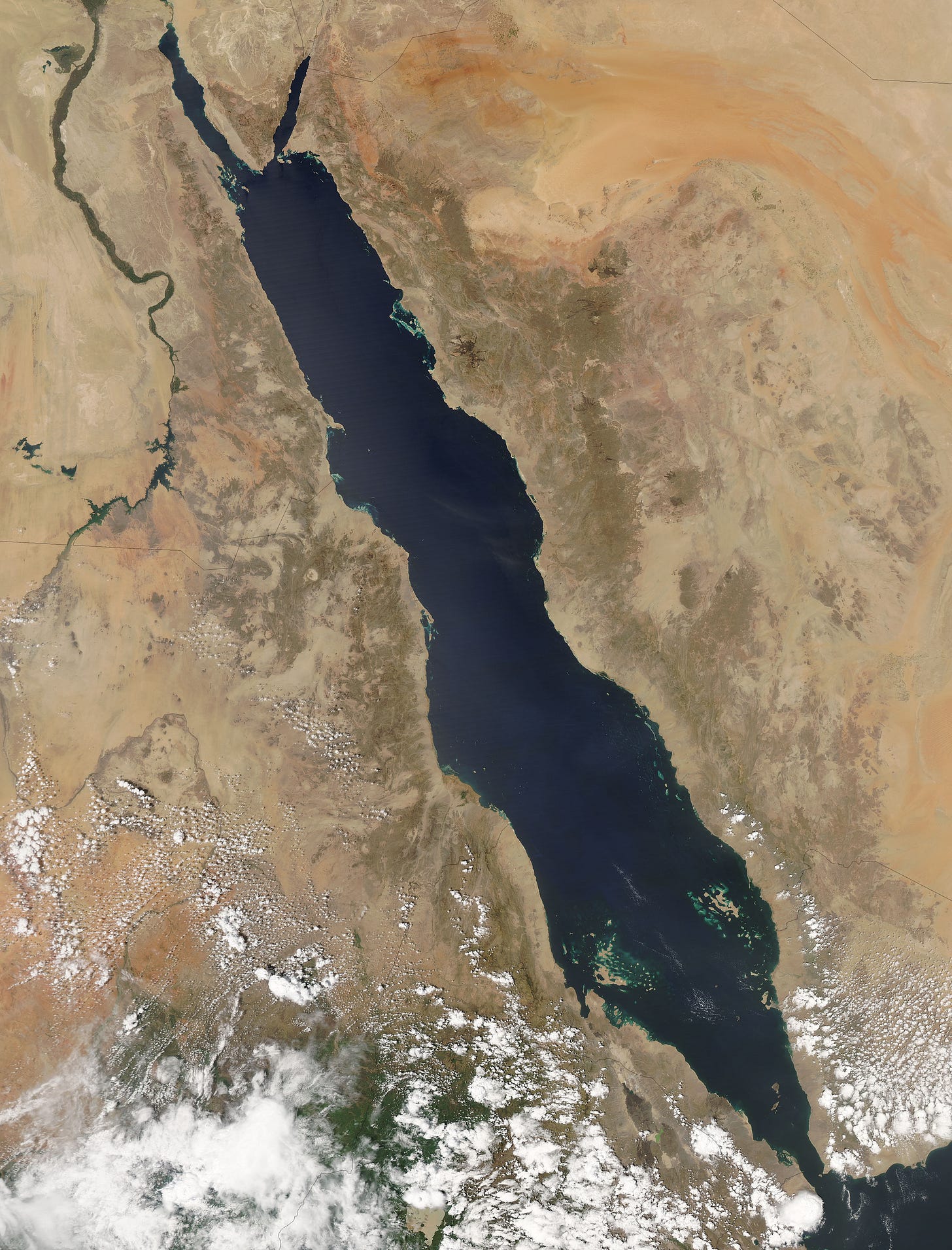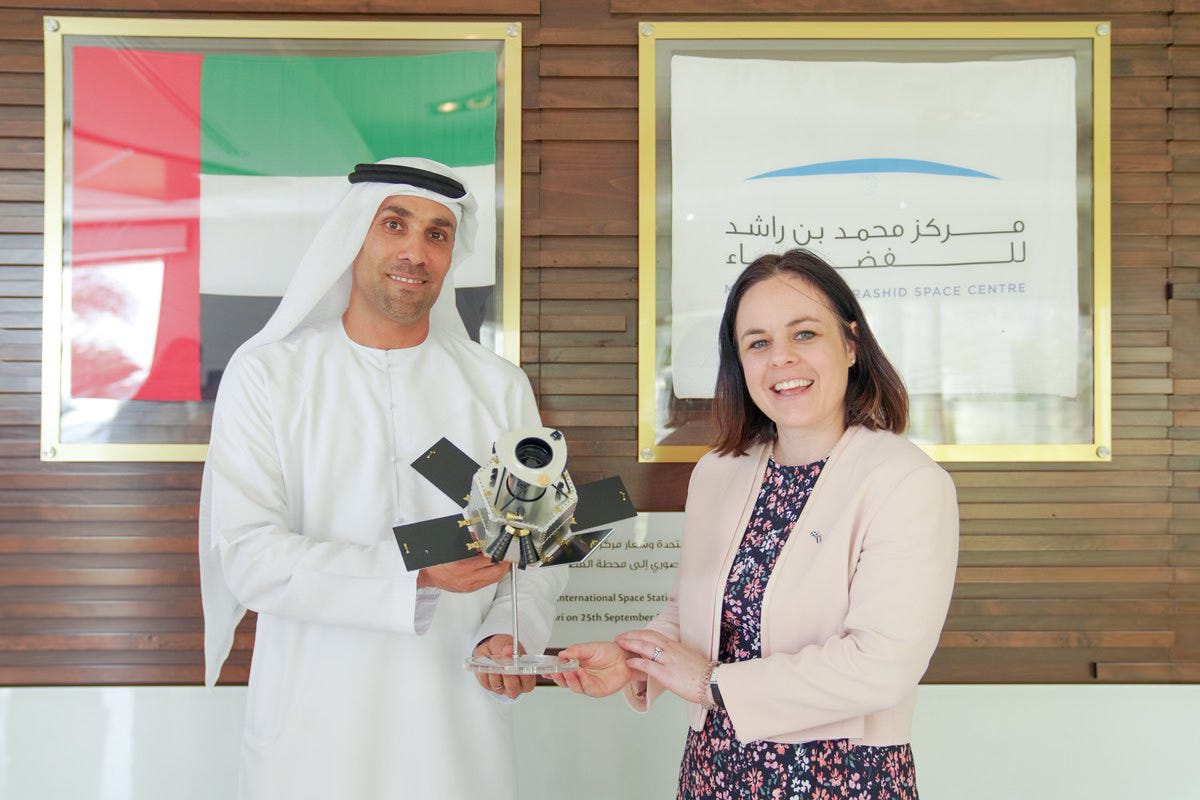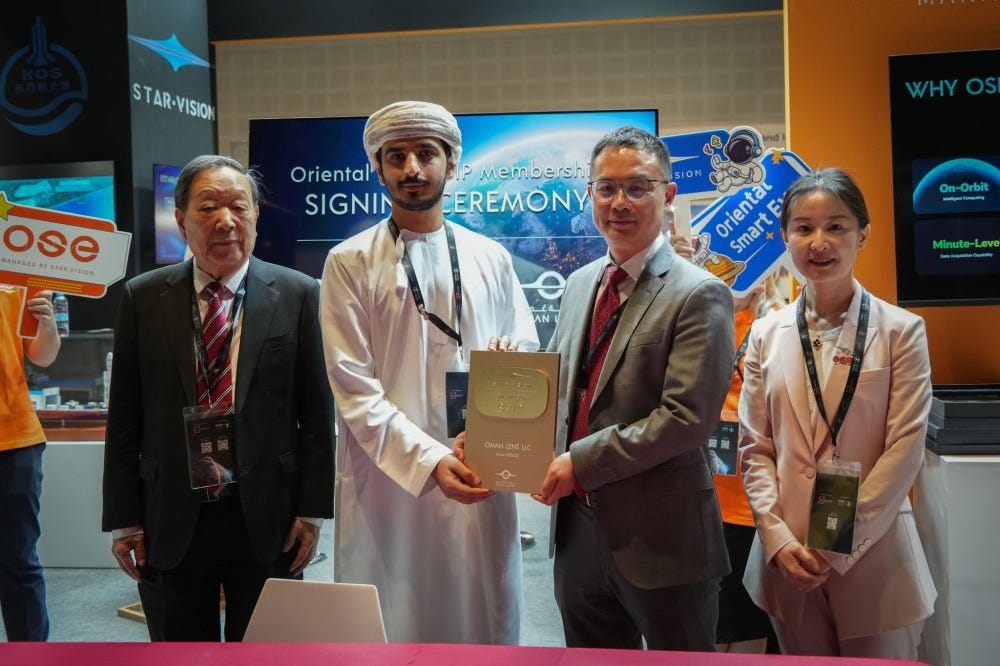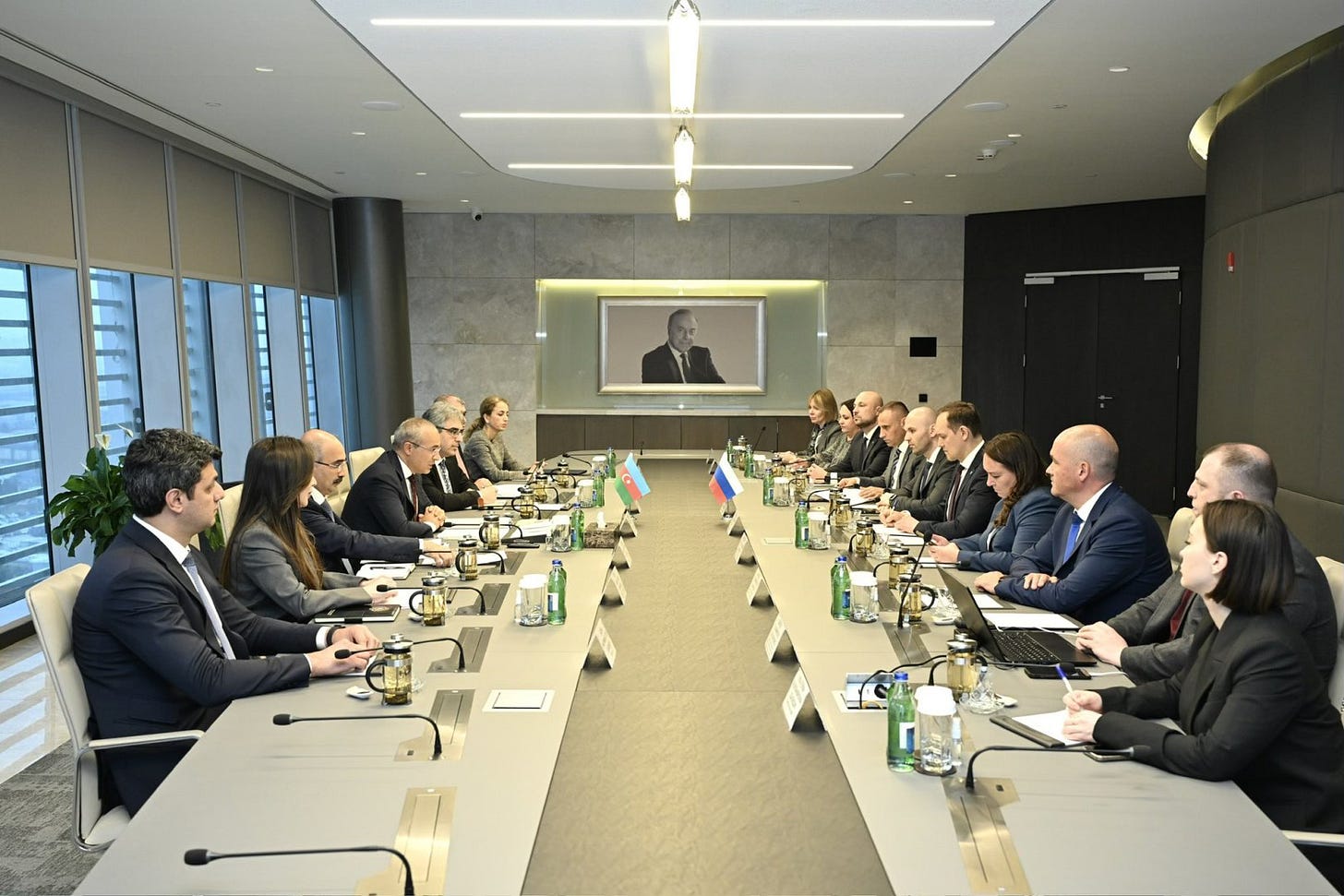Middle East Space Roundup: 14 to 20 April 2025*
A summary of all the space news in the Greater Middle East over the past week, brought to you by AzurX

Global Space Monitor is proud to announce the launch of Latin America Space Monitor (LASM) on Thursday, 24 April 2025. Our Correspondent Veronica Pereyra
Subscribe via this link.
The following are the major space developments in the Greater Middle East region tracked by Middle East Space Monitor over the past week:
China Accused of Supplying Satellite Imagery to Yemen’s Houthis
China Accused of Supplying Satellite Imagery to Iran-Backed Houthis in Yemen
The United States has accused China’s Chang Guang Satellite Technology Co. Ltd. (CGSTL), a company with military ties, of providing satellite imagery to Iran-backed Houthi militants in Yemen for targeting U.S. and international vessels in the Red Sea—escalating concerns over China’s role in global security and space militarization. Despite repeated diplomatic protests, U.S. officials claim Beijing has ignored calls to curb CGSTL’s support, characterizing it as tacit complicity and highlighting China's broader military-civil fusion strategy. CGSTL, sanctioned by the U.S. in 2023 for aiding Russia's Wagner Group, operates over 100 satellites and plans to expand its constellation to 300 by 2025, enabling near-real-time global imaging.
China’s CGSTL Denies U.S. Claims It Provides Satellite Imagery to Iran-Backed Houthis
China’s Chang Guang Satellite Technology Co. Ltd. (CGSTL) has firmly denied U.S. accusations that it provided satellite imagery to Iran-backed Houthi forces for targeting U.S. and international vessels in the Red Sea, calling the claims "groundless," "fabricated," and technically unfeasible. The Chinese company, which specializes in remote sensing services for sectors such as agriculture, environment, and finance, stated that it adheres to all relevant legal and regulatory standards and has no business ties with Iran or the Houthis. Experts cited by Chinese sources argue that the technological limitations of commercial Earth observation satellites, including revisit times and the inability to track moving targets in real-time, render such accusations implausible. The Chinese government also distanced itself from the issue, emphasizing its role in promoting regional stability rather than exacerbating conflict. The denial reflects Beijing’s broader effort to frame its commercial space activities as peaceful and development-oriented amidst rising geopolitical tensions over dual-use satellite technologies.
China’s CGSTL Targets Egypt as Key Customer for Its Kuanfu-02B Earth Observation Satellite
Meanwhile, Chinese satellite manufacturer Chang Guang Satellite Technology Co. Ltd. (CGSTL) is targeting Egypt as a key customer for its latest Kuanfu 02B wide-angle remote sensing satellite, leveraging Cairo’s participation in the Belt and Road Initiative to expand its commercial footprint. The Kuanfu-02B boasts sub-metre (0.5m) resolution and a 150km swath, enabling rapid, high-precision imaging of large regions—making it suitable for land management, environmental monitoring, agriculture, water resource planning, and emergency response. With significant reductions in satellite mass and cost through advanced optical systems and manufacturing innovations, Chang Guang is promoting these satellites to Belt and Road partners like Egypt as a way to achieve autonomous control over critical geospatial data. The company's ability to offer both satellite purchases and data services positions it as a flexible provider for Egypt’s growing interest in Earth observation capabilities. However, U.S. sanctions imposed in 2023, citing the company's alleged support to Russia, could complicate procurement by limiting access to related technologies and launch platforms. Nonetheless, Chang Guang’s commercial strategy, which includes the potential to coordinate launches and provide encrypted orbits for strategic national needs, aligns closely with Egypt’s ambitions to expand its space-based infrastructure and enhance domestic capabilities in satellite applications.
UAE Space Developments
UAE and Japan Near Comprehensive Space Memorandum of Cooperation
During an official visit to Japan from 13 to 16 April 2025, UAE Minister of Industry and Advanced Technology Dr. Sultan Al Jaber advanced bilateral space cooperation as a central pillar of the UAE-Japan Comprehensive Strategic Partnership. Building on the outcomes of the 2024 Abu Dhabi Space Debate and earlier ministerial engagements, the two countries reaffirmed their commitment to formalizing a Memorandum of Cooperation (MoC) between the UAE Space Agency and relevant Japanese entities within the year. This agreement will support joint initiatives under the UAE’s Space Economic Zones program, which aims to commercialize space technologies and promote innovation through international partnerships. Discussions also focused on developing a bilateral roadmap for the space sector and implementing it through targeted seminars and working groups. This renewed focus on space cooperation complements wider strategic dialogues in energy, trade, and advanced technology, reinforcing the UAE’s positioning as a regional space hub and Japan’s interest in collaborative space industry development as both countries deepen their knowledge-based economies.
UAE Space Agency Holds Space Ecosystem Workshop With Stakeholders
The UAE Space Agency hosted a workshop titled “The Space Ecosystem” at its Dubai headquarters, bringing together key national stakeholders as part of its broader strategy to strengthen the country’s space economy. The event focused on advancing a national framework aimed at building an integrated and sustainable space ecosystem, supporting investment opportunities, and reinforcing the UAE’s global competitiveness in the sector. This initiative aligns with the Agency’s commitment to fostering innovation, stimulating private sector involvement, and positioning the UAE as a leading hub for space science, technology, and commercial activity.

UAE’s MBRSC Hosts Delegation Led by Scotland’s Deputy First Minister
Kate Forbes, Deputy First Minister of Scotland, led a high-level delegation to the Mohammed Bin Rashid Space Centre (MBRSC), where she held discussions with Director General Salem Humaid Al Marri on potential collaboration between the UAE and Scotland in the space sector. The visit, which included a tour of MBRSC’s advanced laboratories, highlighted mutual interest in exploring joint opportunities in satellite technology, research, and innovation. This engagement reflects growing international momentum for cross-border cooperation in space, positioning both countries to leverage complementary strengths in advancing commercial and scientific space initiatives.
UAE’s MBRSC Signs MoU With South Korea’s SI Analytics for Geospatial Platform
During Geospatial Week 2025, the Mohammed Bin Rashid Space Centre (MBRSC) signed a Memorandum of Understanding (MoU) with SI Analytics, a subsidiary of South Korea's Satrec Initiative, to jointly develop a satellite data analytics platform. The agreement, formalized by MBRSC Director General Salem Humaid Al Marri and SI Analytics CEO Taegyun Jeon, underscores the UAE's growing emphasis on harnessing satellite-derived data for advanced analytics and decision-making. The collaboration aims to enhance the capabilities of both organizations in processing, interpreting, and applying satellite imagery and geospatial data across sectors such as urban planning, environmental monitoring, and disaster response.
UAE and US Collaborate on Satellite Network to Enhance Emergency Communications
In a strategic move to address communication blackspots and bolster emergency response capabilities, Emirati firm Space42 has partnered with U.S.-based Viasat to develop a shared multi-orbit 5G satellite network. This collaboration aims to provide reliable connectivity in remote areas, enhancing both civilian and emergency communication infrastructures.
UAE Concludes Participation in 40th Space Symposium, Showcasing Space Ambitions
The UAE Space Agency has concluded its involvement in the 40th Space Symposium held in Colorado Springs, United States, highlighting the country's growing role in the global space sector. The event provided a platform for the UAE to showcase its space initiatives and foster international collaborations.
UAE Ministry of Defence Hosts 2nd Annual Communications and IT Conference
The UAE Ministry of Defence organized the 2nd Annual Communications and Information Technology Conference, focusing on enhancing military communication systems and information technology infrastructure, including satellite communications. The conference served as a forum for discussing advancements in defense communications and fostering innovation in military IT solutions.
Anniversary of UAE's Yahsat Launch of First Commercial Telecoms Satellite
In April 2011, the UAE's Al Yah Satellite Communications Company (Yahsat - now a part of Space42) successfully launched its first commercial telecommunications satellite, Al Yah-1A, from the Guiana Space Centre. This milestone was part of a $1.2 billion investment aimed at diversifying the UAE's economy and establishing it as a regional hub for technology and communications. The Al Yah-1A satellite provided television and broadband internet services to over 20 countries across Africa, Asia, and the Middle East, marking a significant step in the country's technological advancement.
UAE’s University of Dubai to Host International Moon Day 2025
The Moon Village Association (MVA) has selected the University of Dubai to host the flagship International Moon Day (IMD) event in 2025, marking a significant milestone for the UAE's growing role in global space discourse. This selection underscores the country's commitment to advancing lunar exploration and fostering international collaboration in space science and technology.
Iran Space News
Report: Iran’s Space Program Advances Despite U.S. Sanctions, Has International Security Implications
Iran is set to inaugurate its new Chabahar spaceport this year, transforming the southeastern coastal city into a strategic launch hub akin to Florida’s Cape Canaveral and reinforcing its growing space program, despite long-standing U.S. opposition linking it to missile development. Iran’s space initiatives—led by both the Iranian Space Agency and the Islamic Revolutionary Guard Corps (IRGC), which is designated a terrorist organization by the U.S.—include a constellation of internet satellites and advanced space launch vehicles like the Simorgh rocket, which analysts say share dual-use technologies with intercontinental ballistic missiles (ICBMs). While Tehran insists its program is civilian and prestige-driven, the West views it as a pillar of military capability amid mounting tensions over nuclear proliferation and regional conflicts. The spaceport’s equatorial location enhances Iran’s launch efficiency, and its cooperation with Russia has accelerated technological gains despite sanctions. The facility, if fully realized, would position Iran as a space power in the Middle East, with implications for regional security and global non-proliferation efforts, especially as Iran pursues broader ambitions including human spaceflight and precision-guided missile technology.
Iran Plans Deployment of Domestically-Built Satellites into Geostationary Orbit
Iran has announced intentions to launch domestically-produced satellites into geostationary orbit within the next year, signifying a major advancement in its space capabilities. This initiative underscores Iran's commitment to developing indigenous space technology and achieving greater autonomy in satellite communications.
Iran Advances Indigenous Satellite Launch Capabilities
Iran is poised to enhance its space program by launching several satellites using its domestically developed Simorgh rocket, a multi-stage, liquid-fueled launcher designed by the Ministry of Defense. This initiative reflects Tehran's strategic focus on achieving self-reliance in satellite deployment and expanding its presence in space technology.
Saudi Arabia Space Developments
Singapore Space Exploration Company Qosmosys Opens R&D Center in Saudi Arabia
Singapore-based Qosmosys has announced the opening of its new office in Riyadh, marking a major strategic shift to establish the Saudi capital as its global headquarters within the next two years. This move reflects the company's ambition to align its R&D and operational capabilities with the Kingdom’s growing role as a space and technology hub. The Riyadh office will oversee key projects including TRIOPS, a lunar positioning and navigation system, and will act as the central node for global coordination and innovation. Qosmosys aims to leverage Saudi Arabia’s economic vision and its positioning in the emerging Moon economy to attract international partnerships and funding. The decision underscores Qosmosys' broader strategy to integrate advanced space technologies with sustainable business models, while reinforcing Saudi Arabia’s status as a key player in future lunar exploration and Earth-oriented tech applications.
Saudi Space Agency Visits ispace U.S. to Examine Technologies for Lunar Exploration
A leadership delegation from the Saudi Space Agency visited the headquarters of ispace U.S. in Colorado, United States, where they met with CEO Ron Garan to explore advanced technologies under development for lunar exploration missions. The visit underscores Saudi Arabia’s growing engagement with global commercial space players as it seeks to accelerate its capabilities in deep space exploration and align with strategic partners contributing to lunar mission architectures. This engagement is part of the Kingdom's broader strategy to position itself as a regional leader in space science and technology, particularly in the emerging lunar economy.
Saudi Arabia’s KAUST Leverages AI for Environmental Monitoring
Saudi Arabia’s King Abdullah University of Science and Technology (KAUST) is integrating artificial intelligence with satellite imaging and Earth observation technologies to monitor environmental changes and extreme weather events. This approach aims to enhance the Kingdom's ability to predict and respond to climate-related challenges, aligning with its Vision 2030 objectives for sustainable development and technological innovation.
Türkiye Space News
Türkiye’s Türksat-6A to be Officially Commissioned on 21 April 2025
Türkiye is set to officially commission Türksat-6A, its first domestically manufactured communications satellite, in a ceremony attended by President Recep Tayyip Erdoğan on Monday, 21 April 2025, marking a milestone in the country's two-decade space technology journey. Developed with a high rate of local content and spearheaded by engineers trained through Türksat's Technology Transfer Program, Türksat-6A expands Türkiye’s satellite coverage to five billion people and positions the country among only 11 countries capable of producing communications satellites. Launched in July 2024 and reaching orbit by December, the satellite is expected to provide services for at least 15 years, reinforcing Türkiye's sovereign capabilities in space and telecommunications infrastructure.
Türkiye Advances Indigenous Earth Observation Satellite Capabilities with IMECE Program
Türkiye's first domestically produced high-resolution Earth observation satellite, IMECE, has marked its second year in orbit, signifying a milestone in the country's space endeavors. Developed with over 90% locally sourced components, IMECE serves various sectors, including defense, agriculture, and urban planning. Building on this success, Türkiye is progressing with the IMECE-2 and IMECE-3 satellites, aiming for launches in 2027 and 2028, respectively. These initiatives align with Türkiye's National Space Program, emphasizing the country's commitment to becoming a prominent player in global space technology.
Opinion: Emerging Orbital Dynamics Reflect Geopolitical Tensions in Space
In the Daily Sabah, Turkish journalist Cüneyd Er writes that recent observations by the U.S. Space Force have highlighted maneuvers by Chinese satellites in low Earth orbit, indicative of a new form of strategic signaling reminiscent of aerial dogfights. Such activities underscore the evolving nature of space as a domain for geopolitical competition, where satellite movements convey legal and strategic positions. This development calls attention to the pressing need for Türkiye to push for updated international frameworks to manage and mitigate conflicts in the increasingly contested orbital environment.
Oman Space Developments

Oman’s Oman Lens Joins China-Led Oriental Smart Eye Satellite Constellation
Oman-based space-technology startup Oman Lens has formalized its entry into the Oriental Smart Eye (OSE) satellite constellation, developed by China's Star.Vision, through a Memorandum of Understanding signed during ISPRS Geospatial Week 2025 in Dubai, UAE. This strategic move positions Oman Lens within a global Earth observation network that aims to deploy 252 satellites equipped with optical, SAR, hyperspectral, and infrared sensors, all leveraging onboard AI for near-instant geospatial analysis. The collaboration highlights Oman’s growing presence in the international space sector, with a focus on AI-powered remote sensing for applications in disaster management, environmental monitoring, and infrastructure development. Oman Lens previously launched its first satellite, OL-1, in partnership with Star Vision and Omani investors, marking the beginning of a 20-satellite constellation plan. The agreement underscores the company’s commitment to joint innovation and technology exchange while enhancing Oman's capabilities in the high-growth geospatial data economy.
Oman's Etlaq Spaceport Introduces Public Engagement with Upcoming Rocket Launches
Oman's Etlaq Spaceport is set to enhance public engagement in space activities by establishing a fan zone for spectators to witness upcoming rocket launches, including the scheduled Horus-4 sounding rocket launch on 30 April 2025. This initiative marks a pioneering effort in the Middle East to involve the public directly in space exploration endeavors, fostering greater interest and participation in the region's growing space sector.
Egypt Space News
African Space Agency HQ Inaugurated in Egypt’s Space City
In a landmark event on 20 April 2025, Egypt inaugurated the permanent headquarters of the African Space Agency (AfSA) within Egyptian Space City, signaling a decisive step toward continental leadership in space science and technology. Endorsed by President Abdel Fattah El-Sisi and attended by African ministers and senior officials, the event marked the operational start of a pan-African institution that will spearhead the continent’s space policy in alignment with Africa’s Agenda 2063. Egypt has committed $20 million in support and infrastructure, demonstrating its strategic intent to anchor African integration through space-based capabilities. The Agency will oversee initiatives such as the African Development Satellite and the African Training Program, which has already trained 71 engineers and scientists from 34 African countries. As Egypt positions itself as Africa’s primary space hub, this development reflects both geopolitical ambition and a vision of using space data and technology to address regional challenges such as climate change, connectivity, and sustainable development.
Egypt’s Nilesat Reports Significant Profit Growth and Announces Shareholder Dividends
Egypt's Nilesat has reported a 31.83% increase in net profits for the fiscal year 2024, reaching $57.68 million. This financial upturn is attributed to strategic investments and enhanced operational efficiency. In light of this performance, the company has declared a dividend of $0.55 per share, scheduled for distribution in May 2025, reflecting Nilesat's robust position in the satellite communications sector.
Other Regional Space Developments
Israel’s Gilat Secures Multimillion-Dollar Defense Contract for Advanced Antenna Technology
Israel’s Gilat Satellite Networks Ltd. has announced a significant contract with a global defense organization to supply advanced antenna technology for integration into sophisticated defense communication systems. This contract underscores Gilat's pivotal role in delivering secure and resilient satellite communication solutions tailored to the stringent demands of defense operations. Deliveries under this agreement are scheduled to commence towards the end of 2025, reflecting Gilat's commitment to supporting critical defense infrastructure worldwide.
GPS Spoofing Attacks Spike in the Middle East and Southeast Asia
A significant increase in GPS spoofing attacks has been observed across the Middle East and Southeast Asia, disrupting air and maritime navigation systems. These incidents, which surged notably in 2024, have continued into 2025, affecting regions including Myanmar and the India-Pakistan border. The scale and sophistication of these attacks suggest involvement by state or military actors, posing serious risks to transportation safety and highlighting the need for enhanced cybersecurity measures in navigation systems.
Challenges Facing Arab Satellite Television Channels
The Arab satellite television industry is experiencing a period of instability, characterized by frequent changes in channel operations and ownership. This "revolving door" phenomenon reflects broader challenges in the media landscape, including political pressures, financial constraints, and competition from digital platforms. The dynamic environment necessitates strategic adaptations by media entities to maintain relevance and influence in the region.

Azerbaijan and Russia Collaborate on Developing National Spatial Infrastructure
Azerbaijan and Russia have initiated discussions to jointly develop advanced national spatial infrastructure. This collaboration aims to enhance economic cooperation, share expertise in registry and cadastre data management, and establish robust spatial data systems to support various national development projects.
Other Regional Space News in Brief:
The leaders of Algeria and Ethiopia held a bilateral meeting in Addis Ababa where several memoranda of understanding were signed, including on space science cooperation;
At the 10th meeting of the Azerbaijan-China Intergovernmental Commission on Trade and Economic Cooperation, space cooperation was discussed;
In Armenia, Slovenia’s Foreign Minister discussed a range of issues with her Armenian counterpart, including space cooperation.
Remember to subscribe to the Latin America Space Monitor (LASM) which launches on Thursday, 24 April 2025.
Subscribe via this link.
Be sure to catch up with space activities in the region in the next edition of Middle East Space Monitor’s space roundup!












